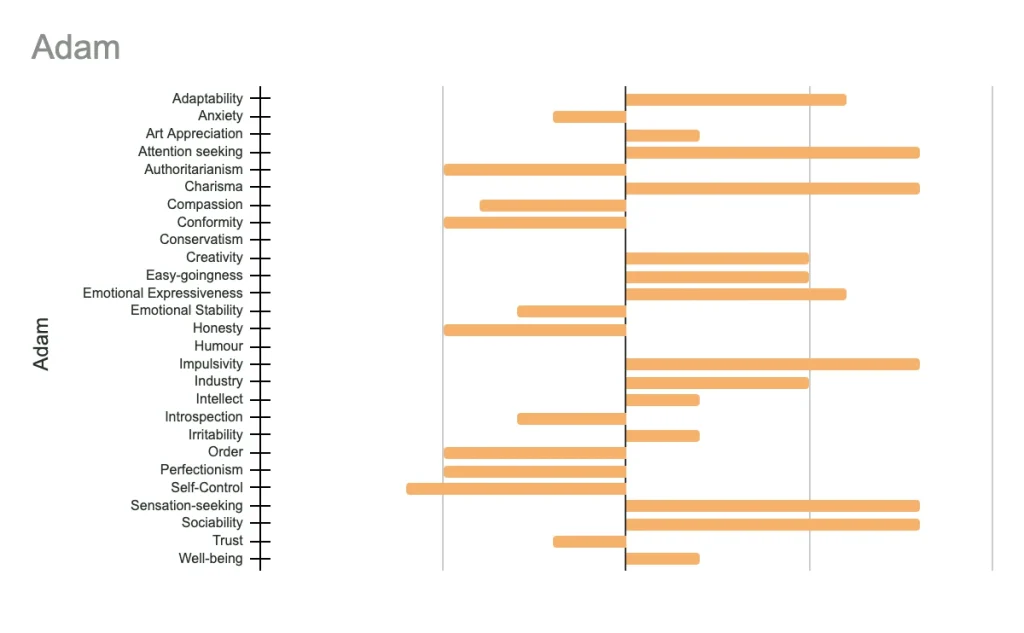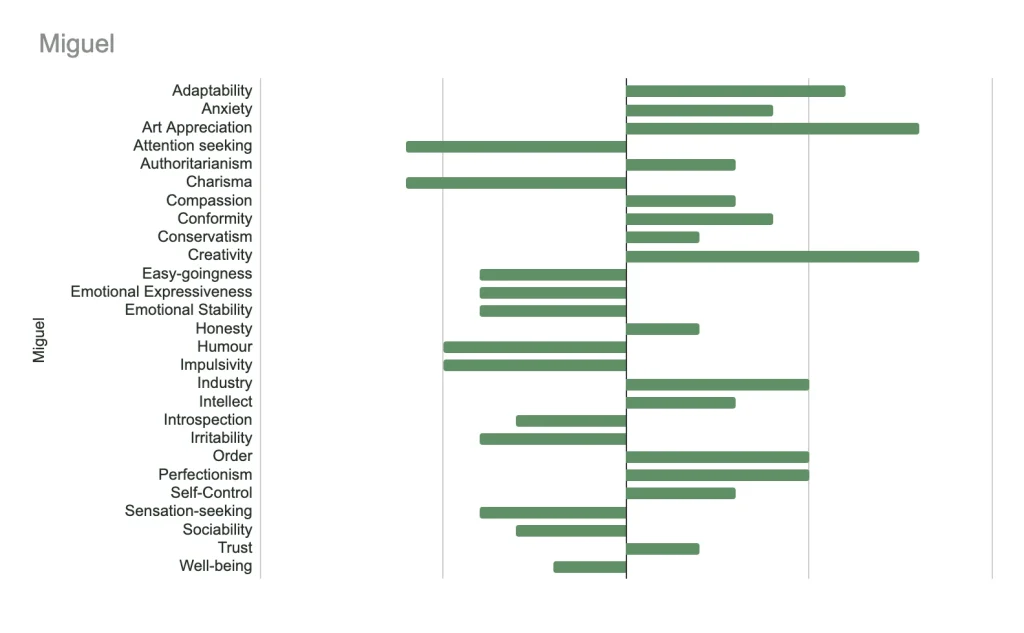
The Cofounder’s Hub has been studying personality traits and how that affects Cofounders in different stages of their partnerships, from good matches, to behaviours to look out for or avoid. By taking the Synthetic Aperture Personality Assessment, you know how you score in 27 different personality traits. The Cofounder’s Hub assesses different personality traits, combinations and pairings to identify points of friction, complementary matches, and areas that require attention.
It is very rare to have notable cofounders’ dirty laundry be available to the public, and so, it is difficult to show personality clashes in action. So, as a case study, The Cofounder’s Hub has taken Apple’s original series WeCrashed, which follows the cofounders of WeWork from the start of the company to its eventual demise. The show is based on real events, but not totally accurate.
Now, for the fun part: we’re going to be estimating where our main characters sit on the SAPA scales, and analysing their cofoundership journey based on our own personality guide. Keep reading to see how this evolves, and if we manage to predict some future friction they might encounter as we go.
After watching the first episode, our estimation of what Adam’s SAPA results would look like is the following:

Remember: the line in the middle is the “average” score. The further to the right, the higher the score. The further to the left, the lower the score. An extremely high Attention Seeking, Charisma and Impulsivity score, paired with low Honesty and Authoritarianism make the alarm bells sound in our head. And it’s not lost on the other characters, or the newspaper that writes that he is the company’s greatest liability. “If you could bottle your confidence, that I’d invest in”, says one of the VC’s after one of his early pitch presentations. His charisma, charm and sociability are his greatest assets, and many find themselves wrapped up in his personality, buying into his allure rather than what he’s actually selling. His drug usage (right before going into the office) and Coco Whip for breakfast suggest he’s high on the Sensation-Seeking scale and low on the Self-Control scale too. The VC hits us with another thought that might sum up these personality traits perfectly: “I think you’re either going to become a billionaire or you’re going to get arrested”.
Adam doesn’t seem to be a stranger to his effect on people either, navigating social situations with ease and steamrolling over soft-spoken people around him effortlessly. Until he meets Rebekah…
Seemingly unimpressed by his charm and looks, Rebekah calls him out for his dishonesty as soon as they sit down for dinner (after two weeks of his relentless pursuit). “Every word since you’ve sat down has been a lie”, she says. Rebekah seems to be highly intuitive and observant, and sees through Adam’s performance easily. Here’s where things get interesting: Rebekah seems to have the traits that are able to anchor Adam’s personality and make him the best entrepreneur/businessman he can be. She likely has a higher score in Order, Introspection, Emotional Stability and a lower score in Sensation Seeking, Impulsivity and Irritability than him. Paired together, they are a Supernova, as Rebekah kindly calls Adam (after he proves himself to her by scaring her thieving boss into submission). He lends her voice, ambition and that “get things done” attitude, while she becomes his anchor, sounding board and mood stabiliser.
So why is she not his Cofounder? Well, Adam needs to take a few shortcuts, and brings on an architect as a Cofounder so that he doesn’t have to pay for one. The quiet and easily charmed Miguel accepts the position excitedly, and gladly works through the night for their first pitch while Adam sleeps soundly. More alarm bells are ringing.
Miguel has his own qualities, like high Industry, Order, Adaptability and Creativity, but doesn’t seem to be a good match for Adam. The first reason being is that he lacks the attitude (that Rebekah demonstrates early on) to level the playing field with Adam, perhaps due to their differing levels of Charisma. He allows himself to be, I daresay, bullied by Adam into putting in the extra work without complaint. Adam’s reasoning? He did his part, he sold the idea. Now it’s Miguel’s job to live up to Adam’s promises.
Now… A nod to the director for this piece of gold: the use of the word we. That pronoun, so simple, carries a ton of meaning in the pilot episode. Obviously, the play on WeWork and WeCrashed is already phenomenal, but we see it pop up in an even more interesting way: Rebekah soon is added into the Cofounder’s mix (without permission from or consideration for Miguel), and starts throwing the word around. “We?”, Miguel asks incredulously the first time she uses it. And that’s it. That’s the first taste of Miguel’s indignation. He might have a low Irritability score, but it’s not going to hold up for 8 episodes. A scoffed repetition of the word after Rebekah uses the pronoun again in what should have been a cofounders’ meeting is eventually what leads to the creation of the name WeWork, and is also foreshadowing of the conflict that is to come.
A second look at WeCrashed through the eyes of The Cofounder’s Hub (episodes 2-4)
Episodes 2-4 have taken a turn. Adam’s personality, however, has remained (predictably) driven by low Conformity, high Impulsivity and high Sensation-seeking. The growth of his company doesn’t affect his stamina and need for more, more, more. “Once you get a sense of accomplishment, growth stops,” he repeats Masa’s phrase like it’s a religion. Like a donkey with a carrot dangling in front of him, he keeps chasing it until he, and his company, are starved.
Rebekah seems to catch the Adam bug and is soon looking for her own seat at the table… but a different table. Her Attention Seeking score proves to be higher than previously suggested, as she cons a theatre producer/director into giving her a leading role with the promise of a space to perform in, and then takes it back once she realises that, there are no two ways about it, she is just a bad actor. The development suggests that Rebekah isn’t as we’d imagined in episode 1, but someone with low Honesty, Emotional Stability and Industry.
After failing her own attempts at a success story, she latches on to being the perfect wife and support network for her husband, even managing to “piss off the millenials” after a speech debacle that offends the feminists in her company, stating that “a big role of women is to help men”. She seemed to be a much bigger threat to the cofoundership of WeWork (Adam and Miguel), but she settles in the background. “She manifests for [Adam]”, an employee jokes when asked what her role in the company is.
Things seem to take a turn for the better for Rebekah when she finds another successful person to attach herself to (am I sensing a pattern?), but Elishia Kennedy is soon snatched up by Adam and his wiles, and ignores her calls. Seems like Adam steamrolls over more than one person…
Which brings us to Miguel. He gets as much screen time as a voice in the company. That is to say, not very much. We see a few key moments in which his irritability finally flares up (what a patient guy!) and he seems to have had enough with Adam. Let’s not forget that Adam coerces him, and Rebekah, to spend their savings on the company. Yet, Adam knows what to say to keep him on board. “We did this”, marvels Miguel when they pull off the launch of WeWork, but Adam feeds him the motivation he needs: “No, you did this”. Ah, sweet validation!
This is what we estimate Miguel’s SAPA results to look like:

He has the makings of a great businessman and employee, but unfortunately, his low Charisma, Sociability and Attention-seeking make him an unnatural entrepreneur, and also explains why he needed an Adam to be able to pull it off. But Adam’s pesky Honesty score makes things oh so complicated.
Adam answers to no one, including his own cofounder. “[Miguel] is too afraid to talk to his cofounder”, a board member says, getting a big “eff you” in response. It’s true, though. It seems like no one can get through to Adam, and he will not bend to any compromise. Miguel’s threats of leaving have been empty, and Adam is confident his partner will stick around, enough to play him at every corner. It is impressive that Miguel is still around. Is there a personality trait for being “resilient to Adam’s nonsense”?
The company is haemorrhaging money and all of his focus is on maintaining his status and getting more investors on board. We watch him playing Masa with a story about feeling like an outsider and seeking community in his young life, and somehow it works. Is there anyone he can’t charm?
The current prediction would be that Adam eventually gets kicked out of his own company, but unfortunately, that’s already been spoiled. In addition to that, one could assume that he will end up without a Miguel or a Rebekah if he continues in this path. He can’t be that charming, right?
A fourth, and final, look at WeCrashed based on The Cofounder’s Hub Prospectus
He crashed, they crashed, We crashed. We’re not surprised at all, but there are a few things that came as a shock. The first part being: Miguel’s big hurrah moment. After seeing a little attitude coming out (by virtue of his art choice), or his irritation seeing that the S1 only mentioned him on 6 pages (mentioning Adam on 169 and Rebecca on 20), it would be expected that some harsh words would be shared, and maybe even some furniture to be thrown. So, when Adam steps into his office, with a sheepish “Miggy-migs!”, it is surprising that he is only met with a meek “You frustrate me […] but I love you. You don’t deserve this”. Wow, Migs. No “I told you so”, or “I tried to stop you”, or even a sign of irritation. Just straight up compassion. Perhaps the personality assessment results for Miguel should have simply read “he’s a better person than most”.
It makes sense. What does it take for a person to have Adam as a cofounder? Miguel is more trusting than the average person, more compassionate and less irritable. It’s no wonder he was able to stick with Adam through thick and thin. Adam and Miguel have similar upbringing styles (commune and Kibbutz) and share kinship through culture and values. Miguel is resilient to strong personalities, but there might be something else at play here. Would Miguel have been able to be a successful solopreneur, or did he ultimately need an Adam in his life to light the fire for him? And would the company have survived if Adam was kicked out earlier? Adam’s shoes are certainly way too big to fill (if he’s even wearing any!), so it must have been daunting to even imagine that as an option.
Rebekah knows that Adam’s light is too bright to compare to as well, and has since stopped trying to be as big as Adam. But she still feels she is a pillar supporting Adam’s grandeur. As we saw last time, Adam had negated Rebekah’s feelings of accomplishment by stating that he built WeWork alone, but he soon remedied that with the infamous and treacherous Bandaid: “I’m giving you the title of cofounder for the company”. Marriage salvaged! Cofoundership somewhat tarnished! Adam can really talk his way out of any trouble.
As for Adam, his character is still where it was in episode 1. He does not change, does not grow, does not adapt. He just pushes forward with his words and charm. However, his lies have finally caught up to him and we watch his employees and the world turn against him. The “messianic” CEO becomes the villain as he fails to deliver all of which he has promised. His quirks become hazards, and his attitudes are perceived as dangerous. Where, before, the world was excited and humoured by his bouts of non-conformity, now they’re judgemental and critical. So, where was the line drawn?
We see a significant change in the perception of Adam by the general public after the S1 is submitted. I guess there are some traditions that you can’t charm yourself out of, and his non-conforming documentation of the companies numbers and expenditure was a laughing stock. It’s like Adam tried to capture his charm and “sell his confidence” on paper, but to do that, he also had to manipulate some numbers. People don’t like feeling like the wool is being pulled over their eyes, especially when it’s their money on the table. While the company was still private, what happened in the accounting room was only Cam’s problem, but the people interested in investing in the IPO failed to see the humour of Adam’s quirks once he was asking for their money.
It was surprising, though, to see that Adam agrees to step down from being CEO (not surprising that it’s Rebekah that convinces him in the end, however). The character arc seems to have happened at WeWork itself, especially when it’s Cam that takes over. He is the perfect Anti-Adam. Charmless, number-focused, about as funny as a funeral. A company built on ideology and big dreams takes a sharp left turn to become “only a coworking space”. Gone are the cult-like behaviours and beliefs, the binge-drinking, the camaraderie… the end of an era that gives way to a sustainable company.
Adam loses his company, fights long legal battles with Masa and some of his employees but still ends up with quite the sum of money. Not quite a trillionaire, as he hoped, but certainly better than he started.
So, what are the lessons we learned from WeCrashed? Crazy gets the job done, but you’d better start delivering before the charm wears off. Oh, and find yourself someone as loyal as Miguel if you’re planning to be a crazy, charming, trainwreck of a CEO.
The characters in this series are only based on real people, so it is hard to believe that someone like Adam, Miguel and Rebekah could truly exist, but they are out there. Watching our main characters and the company “WeWork” from start to finish really highlights the importance of considering personality when you are building a company with someone. If you know the areas of risk, friction, and less-than-ideal communication, you can be proactive about putting processes in place to mitigate disaster. Know your personality, and know your cofounders, and save your company from a terrible crash.
The Cofounder’s Hub is located in beautiful British Columbia. Our team, comprised of experts in the entrepreneurial, business and psychological fields, is working to create a space where you can come for all of your cofoundership needs.
Our goal is to help you build a successful business from start to finish. Using curated tools and resources that focus on the interpersonal relationship between cofounders and their company, we aim to teach, guide and advise you through your journey, equipping you to create the business and partnership you desire.
Get the most relevant resources, announcements, articles, and challenges directly in your inbox in one weekly email.
Read by current cofounders, future cofounders, and those who don’t yet know if they need a cofounder. Inside your inbox, our weekly Digest will arrive packed with valuable content to enhance your cofounder experience including Articles, News, Event Notifications, Podcasts and more!